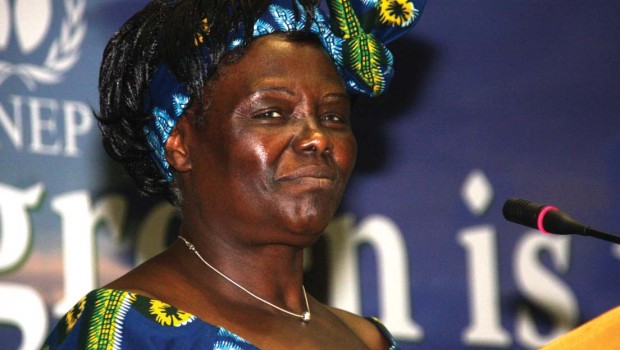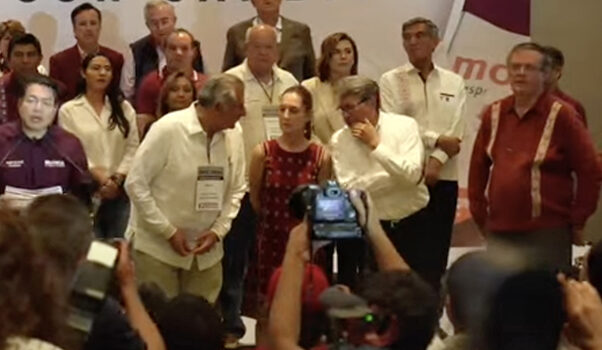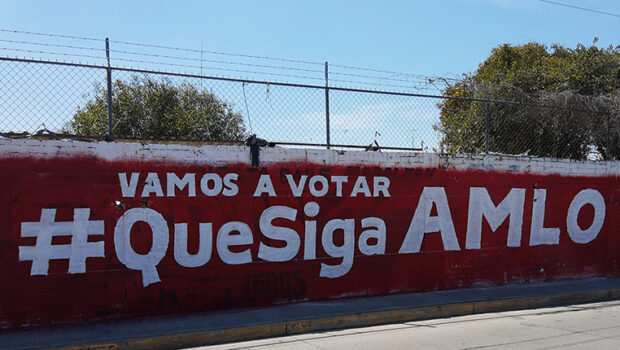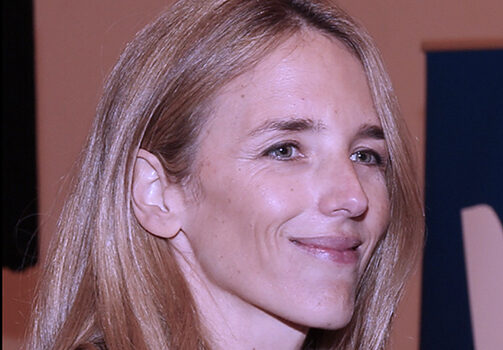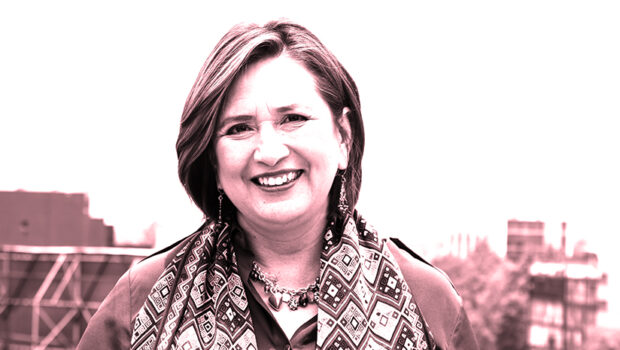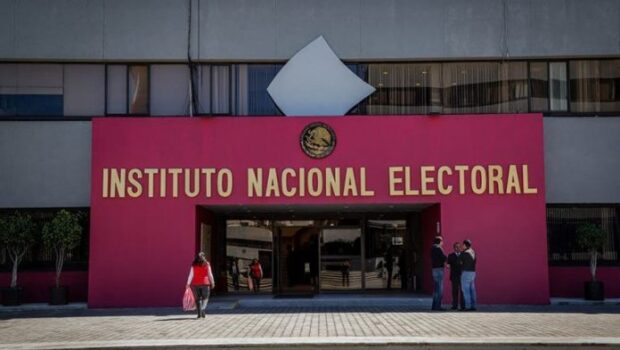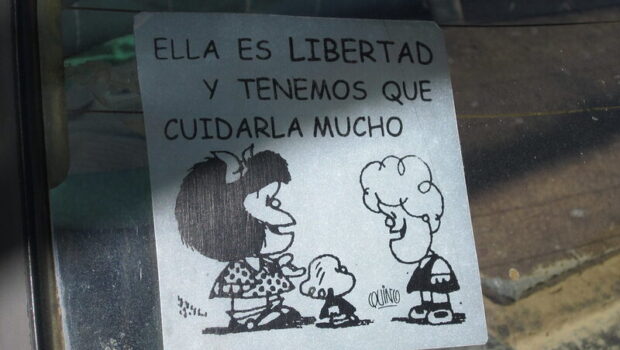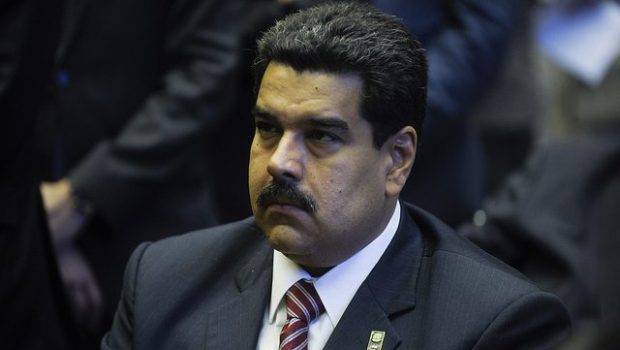Green Belt Movement, A conversation with Shara Fryer
Wangari Maathai
Wangari Maathai (Nyeri, 1940) became the fi rst woman in Africa to receive the Nobel Peace Prize in 2004 in recognition of her environmentalist efforts and contributions to the social, economic and cultural progress of her country, Kenya, as well as other regions throughout Africa. Maathai tackles issues with a holistic approach hat unites democracy and human rights (women’s rights in particular), while thinking globally and acting locally. With this philosophy she founded The Green Belt Movement, the most important and successful reforestation project in Africa. Said program, which is shaped mostly by women, develops communities, protects the environment and amongst the thousands of Kenyans living in poverty propagates the idea that planting trees will improve their lives.
Shara Fryer: Sitting here with you it’s hard to envision how it was for you as a child to have grown up in such a beautiful place and then return as an adult and find it all gone. Describe that moment for us.
Wangari Maathai: Quite often people think I planned this out and created a detailed strategy. I didn’t. I grew up in a country that was very green, clean, with plenty of water, forest, food, etc. That experience at such a young age influenced my view of the environment, and it helped me later on in life to imagine what the world would be without all these things. The world I experienced as a child has completely changed, so I decided to reclaim that environment. Having the benefit of an education helped me to understand how ecosystems worked and to see that what was taking place in my country was destructive. There was something very seriously wrong when the environment could no longer sustain the life of our people.
S. F.: It was cutting the native trees to put in trees for timber that caused the deforestation, which led to soil erosion, to rain waters not being trapped… It was amazing to me, after reading your account, how everything toppled.
W. M.: And how, even to this day, it seems so difficult to explain to people that this is how the system works. When people complain on how we lack water, food, trees, etc., they don’t understand that those are symptoms of environmental degradation. We need to look into what the causes are.
S. F.: So you said, why don’t we plant trees?
W. M.: Yes. I asked many women, but they didn’t know how to plant trees. So I looked for advice from foresters. They are experts, but they are unable to communicate with people that know very little about these things. They were unable to get to the bottom line. We explained to the foresters that these people didn’t know how to read or write, much less differentiate the seeds, and that they didn’t know how to plant trees or create a tree nursery appropriately. We needed to teach them the proper technology. We have the tendency of becoming so educated that we no longer have the capacity to communicate information to people who need it.
S. F.: You plant one tree and it is a beautiful sight to behold. It makes you want to plant many more, doesn’t it?
W. M.: Trees are wonderful. One plants a seed, and it is fascinating to see it germinate, then come out of the ground, then the tree grows taller than you before you know it and by the end of their cycle they become habitats of their own! After several years you can cut them properly and use their wood… One of the best things I’ve heard is when women come to me and tell me that the houses they live in come from the trees they planted.
S. F.: But with the planting of the trees you also saw the air quality improved. More than getting a better life, firewood or even a livelihood, these people saw the return of spring.
W. M.: Yes. When you look at the reasons why we started the program, when I told women to plant trees, we were trying to address the basic needs of these women, and every single one has now been met. Once this was done then we could move to other issues they were not aware of. The need to protect the forest was not important; at the time, they could not see the relationship between forests, rivers and rainfall. They were not aware that when you clear indigenous forests to replace them with timber trees, a custom that was introduced by the colonial administration to help the fast growth of the colony, but in turn was detrimental to the local diversity, they destroyed the benefits that we get from the woodlands. It’s been wonderful to see our citizens transform into a people that now appreciate the forest and want to see it protected. Scientists tell us that the reason why the glaciers vanish is because we have greenhouse gases in the atmosphere, and trees can trap these gases.
Therefore, trees are of the utmost importance because they clean the air. That transformation has been wonderful. What I’ve seen is a huge evolution in our understanding of the environment. When the world met at Stockholm in 1972, at the first United Nations Conference on what was called the human environment at the time—a very narrow concept—they were worried about acid rain. Rachel Carson was very much on our minds then. She is the one who said, the time is coming when we shall have silent springs. At that time, especially in Scandinavia, many lakes were dead, but now, one can fish in the Thames! We have come a long way from that conference, and the green belt movement has been a process championed by ordinary peasant farmers.
S. F.: The result of that was to learn that an individual could make a difference. That a woman has worth because of what she can do, and the impact she can make. It became more than just an environmental concern; it quite naturally led to questioning your place in society, in government, and how the two would interact became a political force as well. Maybe that’s what it was originally intended to be.
W. M.: Yes, originally it was not even intended to do anything much. It was supposed to be a project that would express the concerns of ordinary countrywomen. In Mexico in 1975, however, it became a political movement. It became a pro democracy movement because eventually, and I mentioned this at the beginning, the women were dealing with the symptoms. Therefore we had to address the cause. So what was the cause? Who was destroying the environment? The first to blame was whoever managed the environment. That, of course, was the government, because it’s they who are responsible for public resources. What’s the role of the government? It’s to be a custodian. Who owns these resources? The people. What is happening? The people who were supposed to be custodians were destroying, privatizing and misusing these resources. Therefore we needed to ask them what happened to their role as custodians. They were not supposed to enrich themselves. Our government then felt we were asking questions we shouldn’t ask, but these were the very questions that any citizen should ask. The people who were trusted to protect these resources should have taken care of the women and provided them with clear drinking water! The more we went to the root causes, the more we got to the crux of the matter, and the more we got in trouble.
S. F.: You paid a tremendous price over these years. This didn’t just happen overnight, you have been a part of the movement for 33 years. You have 3 children and you are divorced. By the time you became a panelist, you were beaten, you were arrested. Once you were beaten into a coma. Maybe you were a reluctant leader,in a way. What kept you going?
W. M.: When you are thrust to the front you have two choices, either you run to the back and tell the rest “keep going,” or you face the challenges. I guess the reason I was thrust to the front was because I had the privilege to get an education when others didn’t. In 1960, when I finished high school, J. F. Kennedy wanted to become the next president of the United States. He was engaging African leaders that were just becoming independent at the time. We were helped to write a constitution that we changed as soon as we became independent to better suit the needs of greedy politicians. People like Andrew Young, Martin Luther King, Jessie Jackson met with some of our leaders like Tom Boyer or Dr Kyano, and decided that one way of helping was to put young people into colleges for future leadership. I happened to be in the right place at the right time and found myself on one of the planes that brought students into the US. Here I lived the most wonderful years of my life. It was during the 60´s, during the civil rights movement. I remember the struggles of the time, and though I didn’t participate, I was very much influenced by this experience. I’m quite sure that if I had not come to America, I would not had been so conscious of human rights issues. When I went back, I really started engaging in human rights.
S. F.: Well, you had a president who was virtually a dictator. Largely because of you and The Green Belt Movement, you finally had open elections with more than one party and life changed in Kenya.
W. M.: Yes, and in many ways, that’s the reason he doesn’t like me. We spent a lot of time and energy trying to draw attention to the fact that he was creating wedges between communities, and a lot of the conflicts that were implanted continue to threaten the country to this day. It is true that the African states have come very far from the days of Idi Amin or Bokassa. We have come a long way, but we still have a long way to go to have a leadership committed to good governance, respect for human rights, equal distribution of resources… The leadership of Africa sees itself as being put in a position to benefit or exploit that position: to enrich themselves rather than serve.
S. F.: And their friends, their cronies, and maybe their tribal connections as well.
W. M.: That is why having a man of your tribe at the state house is so important, because it is not an opportunity to serve. Those are the challenges we mention in the book Challenges for Africa. We must get to the point where Africans, and I include myself because I’m part of the African elite, recognize that nobody is going to help us if we don’t create an environment that is conducive to help. If we do not commit ourselves to the improvement of the common welfare of our people, and if we continue to be predators of our own people, nobody will come and help us. Anybody who will come, will come to exploit us.
S. F.: You are rich in resources.
W. M.: Africa is one of the richest continents. But we continue to be seen or to present ourselves as poor people. In part because we don’t have knowledge, we have refused to invest in education. We give a very superficial education. We cannot value these resources.
S. F.: And you have a brain drain too.
W. M.: We have a major brain drain, because we do not create an advantageous environment for professionals. If you feel that you need to utilize your capacity, and you see opportunities in the developed world, you are not going to stay in a place where leaders are holding their people at ransom. We need to create an environment not only where our educated people want to live, but also where educated people from other places want to come. Right now, the people who come to Kenya do not come to work or bring us skills. They come to see the animals.
S. F.: Your book, Challenge for Africa, really is laid out in the most understandable way. The history of colonialism or even the missionaries and their impact in many ways was negative on your culture. The Cold War trapped Africa between superpowers, having to choose sides and not being able to choose for yourselves at that point in time. But you also use great metaphors, you talk about the three-legged stool. Explain.
W. M.: I use metaphors that borrow from our local languages. We used them a lot when we speak. With the three-legged stool I was trying to explain that any nation, no matter how big or how small, needs those three legs. And the first leg is for good governance. I use the word governance because it’s not just the government, it’s the institutions that are responsible for the state: the judicial system, the parliament, the executive branch, schools and hospitals. Our institutions must be solid. And if they are solid, then that makes one leg. The other leg that is extremely important is the management of the resources you have. You might have land, water and minerals, and they must be managed in a very responsible and accountable way. You have to be sure that the people that you as the government represent are sharing these resources. There can’t be citizens who grow extremely rich at the expense of the majority of the country, because that creates a great problem. The third leg is a deliberate and conscious effort to coexist as a diverse nation. There is not a single country in this world without diversity. Africa has many tribes. I thought the United Kingdom was just one people until I discovered they have 4 tribes: The English, the Scots, the Welsh and the Irish. Also, I used to think Japan was homogenous until I visited there. In Africa, our diversity came about in 1885 by the stroke of a pen rather than by negotiations and such. We have these very superficial nations, and our leaders have not tried to unite us, so we don’t have common values that we can all rally around. Instead, we are very committed to our micro-nations. This is a deliberate and conscious choice, to respect diversity and help people live together. It doesn’t mean you stop being who you are, but rather that you respect the person living next to you. Like a normal stool, it has to be carved by a very skilled carpenter. Once you have the strong legs, you can rest on the seat and be very comfortable. That stool is where development can take place. If you have the stool, you can then get aid, loans, education, etc. Things will work because the legs are solid. If you are trying to balance on two legs, you will have a problem no matter how many millions you throw at it.
S. F.: You mention that as well. Malaria, for instance, is a huge problem. I saw a contest on Facebook where a celebrity was challenging CNN to see who could raise the most money for malaria nets in Africa. That’s great, but you make the point that one must make sure that the nets will be used by those who receive them. It’s not enough to throw money or attention at the problem if the three legs aren’t there.
W. M.: The three legs must be there, and we must be realistic. Even as we speak, we receive these cotton nets, but where is this cotton being grown? The nets are made in the US and shipped to Africa. If it is not the cotton that is grown in Africa, then what will they do with the African cotton? You need to establish a cotton industry in Tanzania, so that the people can use their cotton and learn how to make those nets so that they can learn to supply themselves. How long will the US be giving Africans bed nets for? And what happens if you decide to sell them, rather than give them away? If you don’t give them the skill, they will be forever dependent.
S. F.: There was another metaphor that you used that was really wonderful to instill in individuals a self responsibility. It was the wrong bus.
W. M.: I use the concept of the bus because Africans travel by bus a lot. We don’t have trains nor do we fl y as many Americans do. Usually a bus stop is full of busses, and many people can’t read, so choosing the right bus was something that was easy for the audience to relate to. In our civic and environmental education we used this idea. At the beginning I would ask the people what problems do they had in the community. Sometimes they would share a lot of problems because they thought I had a solution to all of them, and I didn’t, but I wanted them to get them off their chests. We put them up on the walls so that they would see them. We would ask them where they thought those problems came from, and they usually blamed the government. They blamed everyone else except themselves. And the challenge was to drive them to the point of realization that, if they go through all those problems one by one, they could find that some of them are their responsibility. If you have cut trees on your land and haven’t made terraces or trenches on your land, the rainwater will take your topsoil away. Crops cannot grow without topsoil! What has the government got to do with that? We came from Orlando this morning, and we knew that we were flying on Continental Airlines. Suppose that instead of flying to Houston, we were taken to New York. We would have been in a lot of trouble! What I’m trying to convey is that, even when making a simple journey, we make decisions, and some of these decisions are analogous to how we manage ourselves as a country. If we have managed ourselves properly, we will not have that many problems. If we would have arrived in New York, we would have reflected and realized that these problems arose because we did not travel in the right direction. In the metaphor, the driver of the bus, or the country, is the president, who is driving all of us citizens in the wrong direction. We can tell we are going the wrong way because look at all the problems we have! How do we change the direction? Do you think the driver knows where he is taking us? Who will talk to him? Can some of us go up to the front of the bus and confront him? Who has the courage to do that? Why have we allowed ourselves to be taken this far by this driver? Fear is always the foremost reason why we don’t take action. It was wonderful to teach this to everyone, and delightful when, at the end of the seminar, everyone would say, “We must get off this bus!”.
Posted: April 17, 2012 at 9:19 pm


